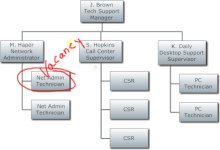- POPULAR ARTICLES
- Thank You Words
- Retirement Wishes
- Face to Face
Job Interview Questions to Ask a Candidate
You have a vacancy to fill.
 You have prepared a set of interview questions to ask potential candidates.
You have prepared a set of interview questions to ask potential candidates.
You reflect on how the previous employee lasted only four months, it was definitely not the right fit. So much time wasted, so many people affected when you had to let the person go before passing probation. Your boss didn't appreciate your hiring mistake either; he had to answer to his boss and to HR, who were questioning your judgment.
This time you want to make sure you have the right person for the position.
What gets in the way of finding the right person for a job? We all know that most candidates are in their best behavior during interviews, so it will take focused listening skills to get to bare reality about the candidate's skills and experience.
We also know that interviewers often assume that the position they are filling is precious and all souls that are looking for jobs will be extremely grateful to be considered for the position. This assumption will lead Interviewers to be less attentive to clues that tells them about the candidate's true expectations, desires and goals.
The following list of questions is designed to both elicit the information you need to know if you have the right person for the vacancy at hand.
Interview Questions to Ask
1. Tell me a little bit about yourself
Why do most interviewers ask this question at the outset? The purpose is to get everybody - candidate and interviewer(s) - warmed up for the more focused questions.
The expected answer is a brief overview of the candidate's professional background. If the person starts to go on tangents, bring her back to focus and move on to the next question.
2. Why did you leave your last job?
What you want from this question is to find any odd ball reasons that may warn you about lack of fit.
As an example, the person tells you she left her last job because she couldn't stand how disorganized the place was. If your place tends to be free flowing and at times chaotic, you already know this is not a good fit for that candidate.
3. What's would your bosses say is your greatest strength and your greatest weakness?
You want to ask the candidate what others would say about her, not what the candidate has to say about herself.
Why? It's more difficult to dress things up when you are conveying what others may say about you.
4. What is your understanding of the job?
The answer to this question will reveal:
(1) The candidate thoroughness: how well she did her homework researching the company and the position. This question lets you see the candidate's degree of resourcefulness and initiative.
(2) The degree to which she understands what the job is all about. This is your opportunity to clarify any misunderstandings about expectations of the job.
A Story
A programmer (let's call him Brett) that used to work in our deparment once told us that what he most appreciated about the job with us was the time flexibility so he could attend Theology school. Brett showed his appreciation by being extremely responsible and hard working. When he finally left to pursue his religious vocation full time, a huge void was left. We hired a new programmer and tried offering him flexibility to make him happy, as happy as Brett. But the new programmer asked for money instead.
You really need to know what the candidate wants.
5. Why do you want this job?
The candidate will likely have a prepared response for this, but try getting beyond such response.
Try to really find out what the candidate sees as pluses of the job or the company.
You need to know this so you can determine if the position can fulfill the candidate's expectations.
A candidate may tell you that they are flexible and open to any job environment. While this may be true, try getting to the candidate's real expectations and wishes.
You want to hire someone that will be happy and enthusiastic about the job, the culture, the pay, you name it.
Don't assume candidates are desperate for any job, it's all temporary and as soon as the job market improves, employees make a move. Literally.
6. Describe the best boss you've ever had
The candidate's answer will reveal what leadership and supervisory practices she's more likely to follow - and display. We tend to like management styles that are similar to ours.
You can then check the candidate's response against your own management style and look for a fit.
You could also ask this question in the opposite way: Describe the worst boss you've ever had. If the candidate answers this question describing traits that fit you to a tee, it's best to place her resume the NO pile as soon as the interview is over.
Don't even think that you can change the candidate into seeing the virtues of your management style, just move on to the next candidate.
7. What is your greatest achievement?
The candidate's answer to this question will reveal more than just her experience, it will tell you what she values, which hopefully matches your own values.
Lets' take as an example, a candidate that won an award for implementing a computer system that saved the company 5 million dollars. The candidate could describe this achievement in various ways, giving emphasis to what she truly values.
She could tell you about the award, and how prestigious and hard to win it is. Or she could tell you about how happy the customers were with the new system. Or she could tell you beaming with pride about the "over $5 million in savings" her project yielded.
If the candidate seems very focused on the savings, and you're looking for someone who can help win some awards and PR for the department or the company, then you may have a mismatch between candidate and position.
8. Describe your most difficult assignment
This question will help you find out a couple of things: (1) You will know the depth of the candidate's experience goes regarding difficult assignments, and (2) You will know the tolerance level of the candidate for challenging situations. In other words, you'll know if the person can handle tough assignments.
If this question doesn't yield valuable info, you can use the following fill-in-the-blank type of question, probing in areas that are relevant to the job.
9. What would you do if ______________ (blank)
The blank could be any number of situations, for example:
"
What would you do if your subordinate goes over your head", or "What would you do if a VIP customer calls you an incompetent?" This open ended question will help dig deeper into the candidate's way of responding to specific events.
10. What are your career goals?
The purpose of this question is to find out if your plans for the position match the candidate's plans for her life. Do not assume people will change life plans to accommodate the company's plans. They seldom do, and when they do, it's a short term sacrifice.
11. Is there anything you want to ask me about the position being filled?
The quality of the candidate's questions is a sign of how prepared they came to the interview.
No need to give elaborate answers to questions posed by candidates, unless of course you have the time and interest.
In Conclusion
If you're looking for common thread in these interview questions to ask a candidate, here it is: You're looking for a fit.
Your questions are aimed at getting information that will tell you if there is a fit between the candidate's background, skills, interests, goals and expectations, and the position's requirements about technical skill level, pay level, schedule, interpersonal skills, and level of commitment.
At times a candidate may be ready to take any job, and will do practically anything to keep it. That doesn't mean you have a good fit, it just means you have a short term and unhappy employee in your ranks. No one - not even the candidate - truly wants that.
Get more Job Interview Advice




